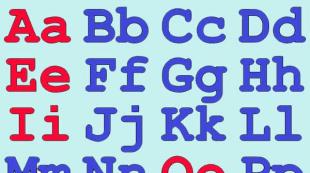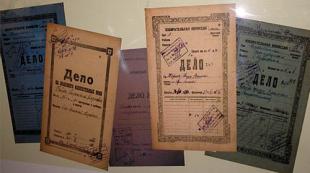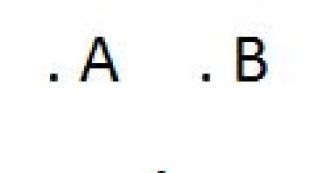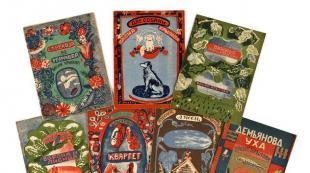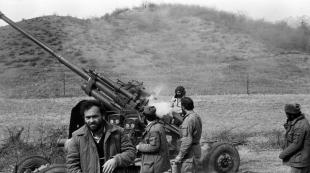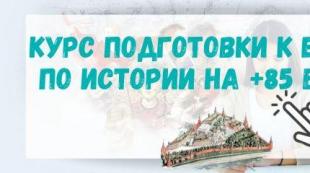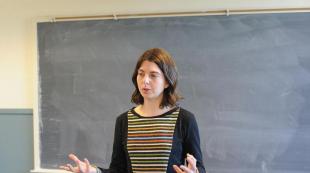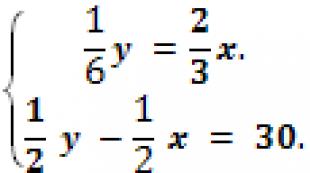Works of Krylov's fable. Ivan Krylov the best fables for children. Why do we love Krylov's fables
It is a work in verse or prose, which is satirical in nature. Any fable begins or ends with moralizing phrases, which in literary circles are usually called morality. The main characters of such works are people, birds, animals, plants, inanimate objects.
From the history of fables
The first fabulist is considered to be Aesop, who lived in Ancient Greece in the VI-V centuries. BC e. Among the Romans, Phaedrus (1st century AD) was a famous author of satirical works. The 17th century gave France and the whole world the talented fabulist Jean de La Fontaine. In Russia, the most famous writer of moralistic poetic works was Ivan Andreevich Krylov (1769-1844). The poet wrote 236 fables during his life, which were published in 9 collections during his lifetime. In his satirical creations, Ivan Andreevich touched the whole of Russia: from ordinary peasants to nobles and the tsar. Some of Krylov's fables in their plots have something in common with the works of Aesop and La Fontaine. There are completely original stories in his work, the content of which has not been found anywhere else.
Heroes of stories
Every Russian person has known Ivan Krylov since childhood. His fables are written in an accessible language using phraseological units, sayings and proverbs. Their stories are distinguished by the reliability of what is happening and touch on topical topics. Greed, stupidity, vanity, hypocrisy, mental limitations and other human vices are presented in the poet's works in the most unattractive form. Although the heroes of Krylov's fables are mostly animals, the author has always associated their images with people. His satire ridicules idle nobles, judges, officials, bureaucrats who do their dirty deeds with impunity. Emperor Alexander I also inherited from the work of Ivan Andreevich: he is not presented in the best possible way in the form of the king of beasts, a lion, in the fables “Motley Sheep” and “Fish Dance”. In contrast to the nobility and rich people, Krylov sympathizes with the poor, suffering from lawlessness and serfdom.

Feature of the poet's works
Krylov's fables are short satirical literary creations that are distinguished by a fascinating plot, dynamism, realistic dialogues, and psychological authenticity of the characters' images. Some of his satires describe everyday scenes (“The Merchant”, “Two Men”), others are allegories (“Wild Goats”), and others are pamphlets (“Pike”, “Motley Sheep”). Krylov also has stories in poetic form (“Mot and Swallow”). The uniqueness of the poet's fables lies in the fact that, despite their more than respectable age, they have not lost their relevance today. And this is not surprising, because human vices do not change over time.
Characteristics of the "Quartet"
The fable "Quartet" is familiar to everyone. Krylov was pushed into her mind by ignoramuses who do not take up their own business. The plot of the fable, written in 1811, is quite simple: a monkey, a bear, a donkey and a goat decided to organize a musical quartet. But no matter how hard they tried to play the instruments, no matter how many times they changed seats, nothing worked out for them. The heroes of the fable did not take into account the most important thing: one desire is not enough to become musicians. To do this, you still need to know at least musical notation and play the instruments. In the phrase of the nightingale, who became an accidental witness to the unsuccessful attempts of the quartet to play, the moral of the whole fable lies: no matter how they sit down, they still will not turn out to be musicians.

Krylov's fable "Quartet" refers not only to unfortunate musicians. The poet in it expressed the idea that skill and talent are necessary in all endeavors that a person undertakes. Often people overestimate their abilities and grab onto overwhelming things, being sure that they will succeed without knowledge and preliminary preparation. Vanity, self-confidence and boastfulness cover their eyes with a veil, and they do not want to understand one thing: any occupation needs to be trained, and this requires a long time and talent. In his work, the author openly laughs at fools and talkers, whose words disagree with their deeds. The heroes of the Quartet fable personify the author's political figures of those times who lacked the professionalism to make the right decisions.
A few words about "Swan, cancer and pike"
Considering Krylov's fables, one cannot ignore his famous satirical creation The Swan, Crayfish and Pike (1814). In the plot of the work, there is a subtle allusion to the events taking place in those days in Russia - the indignation of the Russian people with the discord that reigned in the State Council. The fable begins with a short three-line edification, the meaning of which lies in a simple truth: if there is no agreement among friends, then no matter what they undertake, they will not succeed. It was in the introduction that Krylov expressed the moral of the fable. This is followed by the story itself about how a pike, a crayfish and a swan harnessed to the cart, but could not budge it, because each of them pulled it in its own direction. The fable is one of the most famous creations of the poet, it became popular during his lifetime and remains so to this day. The last line of the fable “and things are still there” turned into a catchphrase, symbolizing the lack of unity in thoughts and actions, and the main characters of the poem became the heroes of numerous caricatures.

The modern school curriculum always includes Ivan Krylov. His fables are easy to understand and therefore understandable to children of all ages. With particular interest, the younger generation reads "To the Crow and the Fox", written by the author in 1807. The creation of Krylov's work was inspired by the work of Aesop, Phaedrus, La Fontaine and other fabulists who had already used a similar plot with a fox and a crow. The summary of the fable is as follows: a crow somewhere got a piece of cheese and flew up a tree in order to eat it. A fox running past liked the delicacy, and she wanted to lure him out of the bird. Sitting under a tree, the cheat began to ask the crow to sing, praising her vocal abilities in every possible way. The bird succumbed to flattering speeches, croaked and the cheese fell out of its beak. The fox grabbed him and ran away. The moral of the fable sounds in its first lines: with the help of flattery, a person will always achieve his goal.

Other notable fables
The moral of Krylov's fables is clear to everyone. In the work "Dragonfly and Ant" its meaning lies in the fact that one who does not think about tomorrow runs the risk of remaining hungry, cold and without a roof over his head. Krylov sings of industriousness in his creation and mocks carelessness, stupidity and laziness.

The moral of the fable "Monkey Glasses" is that people who do not understand the business they are taking on look ridiculous. In a satirical work, ignoramuses are ridiculed in the image of a monkey, and glasses are identified with knowledge. People who do not understand anything in science and take up it will only make others laugh with their stupidity.
Despite the fact that Krylov's fables are short, they very clearly reflect the author's attitude to all kinds of human shortcomings. Oddly enough, but after two centuries that have passed since the writing of the poet's works, nothing has changed in society, so they can still be used today as moralizing stories and educate the younger generation on them.
Krylov Ivan Andreevich (1769-1844) - Russian poet, author of more than 200 fables, publicist, published satirical and educational magazines.
Childhood
Father, Andrey Prokhorovich Krylov, was a poor army officer. When the Pugachev rebellion was pacified in 1772, he was in the service of a dragoon regiment and proved to be a hero, but he did not receive any ranks or medals for this. My father was not particularly trained in sciences, but he knew how to write and read. After retiring, he was transferred to the civil service as chairman of the Tver magistrate. Such a service did not bring a good income, so the family lived very poorly.
The poet's mother, Krylova Maria Alekseevna, was left a widow early. The husband died at the age of 42, the eldest son Ivan was only 9 years old. After the death of the head of the family, the life of the Krylovs became even poorer. Ivan's early childhood years were spent on the road, as the family moved very often as part of his father's service.
Education
Ivan Krylov did not have the opportunity to receive a good education. When he was little, his father taught him to read. The elder Krylov himself was very fond of reading and left a large chest full of books as a legacy to his son.
Wealthy neighbors lived nearby, allowing the boy to attend the French lessons taught to their children. So Ivan gradually learned a foreign language. In general, Krylov received all his education mainly due to the fact that he read a lot.
But what attracted him greatly as a teenager was noisy fairs and fist fights, shopping areas and folk gatherings, he liked to hang around among the simple people and listen to what they were talking about. At one time, he even took part in street fights, which were called "wall to wall", the guy himself was very strong and tall, so he often came out the winner.
Labor activity
Due to the fact that the family was in need, Krylov started working very early. In 1777, he was taken to the magistrate of Tver, where his father served until his death, as a subclerk. They paid a penny there, but at least the family did not die of hunger.
In 1782, the mother and sons moved to St. Petersburg to apply for a pension. Here Ivan got a job in the state chamber with a salary of 80-90 rubles.
In 1788, his mother died, and Krylov was completely responsible for raising his younger brother Lev. Ivan Andreevich took care of him all his life as if he were his own son. Work in the state chamber ceased to suit Krylov and he went to work in the Cabinet of Her Majesty (it was an institution like the personal office of the Empress).

Literary activity
In 1784, Krylov wrote his first work, the opera libretto The Coffee House. In the next two years, he composed two more tragedies, Cleopatra and Philomela, followed by the comedies The Mad Family and The Writer in the Hallway. So the young playwright began to work closely with the theater committee, while receiving a free ticket.
The next comedy "Pranksters" was different from the two previous ones, it was already bold, lively and witty in a new way.
In 1788, Krylov's first fables were published in the Morning Hours magazine. They did not receive caustic and sarcastic approval from readers and critics.
Krylov decided to abandon the public service and engage in publishing. For several years he was engaged in the release of satirical magazines:
- "Mail of Spirits";
- "Viewer";
- "St. Petersburg Mercury".
In these magazines he published his fables and some prose works.

The authorities were not too fond of such sarcasm of Krylov, the Empress even suggested that he go abroad for a while. But Ivan Andreevich refused and moved to Zubrilovka, the estate of Prince Golitsyn. There he worked as a secretary, taught children, and also wrote plays for home performances.
Krylov returned to active literary activity in 1806. He arrived in St. Petersburg, where he staged two comedies, Fashion Store and A Lesson for Daughters, one after the other, which were a huge success.
And in 1809, Krylov began to take off as a fabulist. The first collection of his fables included 23 works, among them the famous "Elephant and Pug". The book turned out to be very popular, and readers began to look forward to Krylov's new fables.
Along with this, Ivan Andreevich returned to public service, for almost 30 years he worked in the Imperial Public Library.

More than 200 fables came out from Krylov's pen, in which he denounced both human vices and Russian reality. Each child knows such his works:
- "Wolf and Lamb";
- "A Crow and a fox";
- "Dragonfly and Ant";
- "Swan, Cancer and Pike";
- "Monkey and Glasses";
- "Quartet".
Many expressions from his fables have firmly entered the colloquial Russian speech and have become winged.
last years of life
In the last years of his life, Krylov was in good standing with the tsarist government, received the post of State Councilor and had an ample pension allowance. He became lazy, did not hesitate to be known as a slut and a glutton. We can say that all his talent at the end of his life was dissolved in gourmetism and laziness.

Officially, Krylov was never married, but his contemporaries claimed that he lived in a civil marriage with his cook Fenya, and from him she gave birth to a daughter, Sasha. When Fenya died, Sasha lived in Krylov's house, then he married her off, nursed the kids, and after death wrote off all his fortune to Sasha's husband.
(ratings: 2
, average: 3,00
out of 5)
 Name: Krylov Ivan Andreevich
Name: Krylov Ivan Andreevich
Birthday: February 13, 1769
Place of Birth: Moscow, Russian Empire
Date of death: November 21, 1844
A place of death: Saint Petersburg, Russian Empire
Biography of Krylov Ivan Andreevich
Ivan Krylov was born in 1769 in the family of an army officer in Moscow. There is very little information about the writer. Everything that is known about him was told by his contemporaries. Therefore, there are many empty spaces in his biography.
When Krylov was small, his family constantly moved from place to place. They lived in Tver and were  very poor. The situation became even more deplorable and tragic when Krylov's father died in 1778.
very poor. The situation became even more deplorable and tragic when Krylov's father died in 1778.
The boy was trained by his father, after his death, Krylov went to home teachers who came to a wealthy family in the neighborhood.
He worked as an under-clerk in the Kalyazinsky Lower Zemstvo Court, and later in the Tver Magistrate.
When the family moved to St. Petersburg, the mother, for the sake of her son, does everything possible so that he gets a good position, and he is taken to the St. Petersburg Treasury Chamber as a petty official. Krylov himself was actively engaged in self-education.
The work of Ivan Krylov, together with the works of Alexander Pushkin and Alexander Griboedov, is considered the beginning of Russian literary realism.
Krylov's first works are dramatic works written in the period 1786-1788. This includes "Coffee House", "Mad Family", "Pranksters", and many others. Unfortunately, these works did not receive appreciation from readers.
 In 1788, Krylov left the service and began working as a journalist. In 1789, his satirical magazine Spirit Mail was published. As a result, the magazine is banned, since Krylov represents officials in the form of various animals and skillfully ridicules them. In 1791, together with friends, he published several more magazines, however, they were also closed. Information has been preserved that Krylov had to communicate with Catherine II herself because of scandalous magazines.
In 1788, Krylov left the service and began working as a journalist. In 1789, his satirical magazine Spirit Mail was published. As a result, the magazine is banned, since Krylov represents officials in the form of various animals and skillfully ridicules them. In 1791, together with friends, he published several more magazines, however, they were also closed. Information has been preserved that Krylov had to communicate with Catherine II herself because of scandalous magazines.
In 1793 Krylov returned to Moscow. Since 1795, according to some reports, he was forbidden to live in St. Petersburg and Moscow.
In 1797, he served as Prince Galitsyn's personal secretary and went into exile with his family. When the prince was appointed governor-general of Livonia, Krylov worked for the next few years as the manager of the chancellery.
Krylov returns to literature in 1800. He wrote an anti-government comic work called Podchipa, or Triumph. It, of course, was banned by censorship, but still it became the most popular play.
In 1806, Krylov again moved to St. Petersburg. In the period from 1806 to 1807, he wrote two comedies - "The Fashion Store" and "A Lesson for Daughters", which also received great success.
Krylov is known for his fables. He first tried himself in this area in 1805, when he translated several fables of La Fontaine. In 1809, a collection of fables was published for the first time. It was during this period that active  I am Krylov's activity in the field of writing fables. He felt what real fame is, because his works are published even in Paris.
I am Krylov's activity in the field of writing fables. He felt what real fame is, because his works are published even in Paris.
Krylov was a very extraordinary person. He often became the main character of jokes and tales even in those days. He had many vices, like gluttony, untidiness, which he not only was not afraid of, but also exhibited in every possible way.
He has been learning and developing all his life. Two languages, English and ancient Greek, he studied until the end of his life. He was respected and appreciated even by those who did not share his views on how creativity should look like.
Ivan Krylov died in 1844. He was buried in St. Petersburg Alexander Nevsky Lavra.
Documentary
Your attention is a documentary film, a biography of Krylov Ivan Andreevich.
Bibliography of Krylov Ivan Andreevich
fables
- Alkid
- Apelles and the colt
- Poor rich man
- atheists
- Squirrel (two fables about the squirrel are known)
- Rich Man and Poet
- Barrel
- Razors
- Bulat
- Cobblestone and Diamond
- Kite
- cornflower
- nobleman
- Noble and Poet
- Noble and Philosopher
- divers
- Waterfall and Stream
- wolf and cub
- Wolf and Crane
- wolf and cat
- Wolf and Cuckoo
- Wolf and Fox
- Wolf and Mouse
- Wolf and Shepherds
- Wolf and Lamb
- Wolf in the kennel
- Wolves and Sheep
- Crow
- Crow and Chicken
- crow
- Raising a Lion
- Golik
- mistress and two maids
- Crest
- two doves
- Two boys
- Two Guys
- Two barrels
- Two dogs
- Demyanov's ear
- Tree
- Wild Goats
- Oak and cane
- Hare on the hunt
- Mirror and Monkey
- Snake and Sheep
- Stone and Worm
- Quartet
- The slanderer and the snake
- Ear
- Mosquito and Shepherd
- Horse and Rider
- Cat and Cook
- Cauldron and Pot
- Kitten and Starling
- Cat and Nightingale
- Peasants and the River
- Peasant in trouble
- The Peasant and the Snake
- Peasant and Fox
- Peasant and Horse
- Peasant and Sheep
- Peasant and Worker
- Peasant and Rogue
- Peasant and Dog
- Peasant and Death
- Peasant and Ax
- Cuckoo and Gorlinka
- Cuckoo and Rooster
- Cuckoo and Eagle
- Merchant
- Doe and Dervish
- casket
- Swan, Cancer and Pike
- Leo and Bars
- Lion and wolf
- Lion and mosquito
- Lion and Fox
- Lion and Mouse
- Lion and Man
- Lion on the hunt
- lion aged
- Lion, Chamois and Fox
- fox builder
- Fox and Grapes
- Fox and Chickens
- Fox and donkey
- Fox and Marmot
- Leaves and Roots
- Curious
- Frog and Ox
- Frog and Jupiter
- Frogs asking for a king
- Boy and snake
- Boy and Worm
- monkey and glasses
- Bear in nets
- Bear at the Bees
- Miller
- Mechanic
- Bag
- Worldly gathering
- Myron
- Pestilence
- Mot and Swallow
- Musicians
- Ant
- Fly and road
- Fly and bee
- Mouse and Rat
- Dinner at the bear
- Monkey
- Monkey
- Sheep and Dogs
- Gardener and Philosopher
- Oracle
- Eagle and Mole
- Eagle and Chickens
- Eagle and Spider
- Eagle and bee
- Donkey and Hare
- Donkey and Man
- Donkey and Nightingale
- Farmer and Shoemaker
- Hunter
- Peacock and nightingale
- Parnassus
- Shepherd
- Shepherd and the sea
- Spider and bee
- Rooster and Pearl Seed
- motley sheep
- Swimmer and Sea
- Plotichka
- Gout and Spider
- Fire and Diamond
- Funeral
- parishioner
- Walkers and Dogs
- Pond and River
- Hermit and Bear
- Guns and Sails
- bee and flies
- Picky Bride
- Chapter
- Grove and fire
- Creek
- Fish dance
- Knight
- Pig
- Pig under the Oak
- Tit
- Starling
- Stingy
- Miser and Chicken
- Elephant in the event
- Elephant in the Voivodeship
- Dog and Horse
- Dog, Man, Cat and Falcon
- dog friendship
- Mouse Council
- Falcon and Worm
- Nightingales
- Writer and robber
- An old man and three young
- Shadow and Man
- Trinity
- Trishkin caftan
- Hardworking Bear
- Owl and Donkey
- Fortune and the Beggar
- Hop
- Host and Mice
- flowersflowers
- Chervonetsv
- Chizh and Hedgehog
- Chizh and Dove
- Pike and cat
- Pike and mouse
- Lamb
Other writings
- 1783 - Coffee pot (libretto of a comic opera)
- 1786 - Mad Family (comedy)
- 1786-1788 - Writer in the hallway (comedy)
- 1786-1788 - Pranksters (comedy)
- 1786-1788 - Philomela (tragedy)
- 1788 - Americans (comedy, together with A. I. Klushin)
- 1792 - Kaib (satirical story)
- 1792 - Nights (a satirical story; unfinished)
- 1798-1800 - Trumph
- 1801 Pie (comedy)
- 1806 Fashion Store (comedy)
- 1807 - A lesson to daughters (comedy)
- 1807 - Ilya the Bogatyr (comedy)
- Frogs asking for a king (fable)
- 1805 - Dragonfly and Ant (fable)
Compilation, preface, notes and explanations
V.P. Anikina
Artists
S. Bordyug and N. Trepenok
Russian genius
Twenty-year-old Ivan Andreevich Krylov, still a little-known writer, published his first fables in 1788, without a signature, in the St. Petersburg magazine Morning Hours. And he published the first book of fables years later - only in 1809. Not without success, having worked in various types of creativity, Krylov realized that the fable genre was most successful for him. The fable became an almost exclusive genre of his work. And soon the glory of a first-class author came to the writer.
The artistic gift of Krylov the fabulist was fully revealed when he combined his extensive knowledge in the field of ancient and new European literatures with the realization that the type of creativity he had chosen by nature belongs to the kind of creativity in which folk morality is expressed. This morality, for example, is revealed in Russian fairy tales about animals, in proverbs, in teachings - in general, in peasant fables. In Rus', an intricate story has long been called fable. "Fables-fairy tales" are inseparable from the living conduct of a story-fiction, flavored with a joke, a lesson. This was not understood for a long time by many of Krylov's predecessors, who failed because they did not realize that the fable is inseparable from the spoken language.
Thus, the hard-working philologist known in the 18th century, a member of the St. Petersburg Academy of Sciences V.K. Tredyakovsky (1703-1768), long before Krylov, published a retelling of several "Aesopian fables". Among them was the fable "The Wolf and the Crane". Its plot is the same as that of Krylov, but in the presentation of the fable, almost everything is alien to colloquial speech.
A wolf choked on a sharp bone on a certain day.
So that he was not able to howl, but he became all in a stump.
For that, he hired a crane at a price,
To extract the nose from the throat with longitude.
Tredyakovsky guessed that the fable story should be told in a folk way, and it was not by chance that he introduced into his translation some colloquial words and expressions (although not without distortion): remained heavy, bookish.
Compare with Tredyakovsky's translation of Krylov's fable:
That wolves are greedy, everyone knows:
Wolf, eaten, never
Doesn't understand bones.
For something on one of them trouble came:
He nearly choked on a bone.
The wolf can't neither gasp nor breathe;
It's time to stretch your legs!
The whole system of presentation is light, elegant, understandable to any Russian person! This is our living speech. Krylov followed the intonation of the oral story; in the fable story there is not even a shadow of any kind of artificiality.
The famous philologist of the 20th century, Viktor Vladimirovich Vinogradov, specially studied the language and style of Krylov's fables and noted dozens of folk proverbs in them. The scientist gave a long list of proverbs and sayings that the fabulist used, called them "semantic bonds", that is, connections that give the presentation of a fable story a semantic unity. Here are some of them: “The family is not without its black sheep” (“Elephant in the Voivodeship”), “Though the eye sees, but the tooth is dumb” (“The Fox and the Grapes”), “Poverty is not a vice” (“The Farmer and the Shoemaker”), “From the fire to the frying pan” (“The Lady and the Two Servants”), “Do not spit in the well - it will come in handy to drink water” (“The Lion and the Mouse”) and dozens of others. The fabulist relied on the usual designations in our language and comparisons of animals and birds with people: a crow is a prophetic, but greedy for flattery, a stubborn donkey, a cunning fox, a strong but stupid bear, a cowardly hare, a dangerous snake, etc. And they act like people. Proverbs and sayings, proverbs and allegory words included in the fables received development and semantic clarifications from Krylov.
Krylov's primacy among fabulists is preserved to this day. And in our time, his fables captivate readers. He is put on a par with the greatest artists of all times and peoples. No one is surprised that he is compared with the ancient Greek Aesop, with other world-famous fabulists. But most of all he is appreciated in Russia as an artist who expressed the common sense and mind of our people.
V.P. Anikin
A Crow and a fox
How many times have they told the world
That flattery is vile, harmful; but it's not all right,
And in the heart the flatterer will always find a corner.
___
Somewhere a god sent a piece of cheese to a crow;
Crow perched on the spruce,
To have breakfast, it was quite ready,
Yes, I thought about it, but I kept the cheese in my mouth.
The Fox ran close to that misfortune;
Suddenly, the cheese spirit stopped Lisa:
The fox sees the cheese, the fox has been captivated by the cheese.
The cheat approaches the tree on tiptoe;
He wags his tail, does not take his eyes off the Crow,
And he says so sweetly, breathing a little:
"Darling, how pretty!
Well, what a neck, what eyes!
To tell, so, right, fairy tales!
What feathers! what a sock!
And it must be an angelic voice!
Sing, little one, don't be ashamed! What if, sister,
With such beauty, and you are a master of singing,
After all, you would be our king bird!
Veshunin's head was spinning with praise,
From joy in the goiter breath stole, -
And to the friendly fox words
The crow croaked at the top of its crow's throat:
The cheese fell out - there was such a cheat with it.
Oak and Cane
With the Reed, the Oak once entered into speech.
“Verily, you have the right to grumble against nature,”
He said: “Sparrow, and that one is hard for you.
A little light breeze will ripple the water,
You will stagger, you will begin to weaken
And so you bend down lonely,
What a pity to look at you.
Meanwhile, on a par with the Caucasus, proudly,
Not only do I block the rays of the sun,
But, laughing at both whirlwinds and thunderstorms,
I stand firm and straight
As if surrounded by an inviolable peace.
Everything is a storm for you - everything seems to me a marshmallow.
Even if you grew up in a circle,
Thick shade of my branches covered,
From bad weather, I could be your protection;
But nature has taken you to your lot
The shores of the turbulent Aeolian domain:
Of course, she doesn’t have any joy about you at all. ” -
"You are very compassionate"
Cane said in response,
“However, do not collapse: I don’t have so much thin.
It is not for myself that I am afraid of whirlwinds;
Though I bend, I do not break:
So storms do little harm to me;
They threaten you no more!
It is true that even hitherto their ferocity
Your fortress did not overcome
And from their blows you did not bow your face;
But - let's wait for the end!
As soon as the Cane said this,
Suddenly rushing from the northern sides
And with hail, and with rain, a noisy aquilon.
The oak is holding on - Reed crouched to the ground.
The wind is raging, he doubled his strength,
Roared and uprooted
The one who touched the heavens with his head
And in the area of shadows he rested on his heel.
Musicians
Neighbor called neighbor to eat;
But the intent was different:
The owner loved music.
And he lured his neighbor to listen to the singers.
Well done sang: some in the forest, some for firewood,
And who has that power.
The visitor's ears crackled,
And the head was spinning.
"Have mercy on me," he said in surprise:
“What is there to enjoy here? your choir
Shouting nonsense! -
"That's true," the owner replied with tenderness:
“They fight a little;
But they don’t take intoxicating things in their mouths,
And all with great behavior."
___
And I'll say: for me it's better to drink,
Yes, understand the matter.
Crow and Chicken
When the Smolensk Prince,
Arming yourself with art against insolence,
Set up a new network for vandals
And left Moscow to their death:
Then all the inhabitants, both small and large,
Without wasting an hour, we gathered
And out of the walls of Moscow rose,
Like a swarm of bees from a hive.
The crow from the roof is here for all this anxiety
Calmly, cleaning his nose, looking.
“And what are you, gossip, on the road?”
From the cart the Chicken shouts to her:
“After all, they say that at the threshold
Our adversary." -
“What is it to me?”
The prophetess replied to her: “I will stay here boldly.
Here are your sisters, as they wish;
But Raven is neither fried nor boiled:
So it’s not surprising for me to get along with the guests,
And maybe you'll still be able to profit
Cheese, or a bone, or something.
Farewell, Corydalis, happy journey!
The crow truly remained;
But, instead of all the treats for her,
How to starve Smolensky became a guest -
She herself got into their soup.
___
So often a person in calculations is blind and stupid.
For happiness, it seems that you are rushing on your heels:
And how do you actually deal with him -
Got caught like a crow in soup!
casket
It often happens to us
And work and wisdom to see there,
Where you can only guess
Just get down to business.
___
Someone brought a casket from the master.
Finishing, cleanliness Casket rushed into the eyes;
Well, everyone admired the beautiful Casket.
Here comes the sage into the mechanics room.
Looking at the casket,
he said: "A chest of secrets,
So; he is without a lock;
And I undertake to open; yes, yes, I'm sure of it;
Don't laugh so hard!
I will find a secret and I will open the Casket for you:
In Mechanics, and I'm worth something.
Here he took up the Casket:
Spins it around
And he breaks his head;
Now a carnation, then another, then a bracket shakes.
Here, looking at him, another
Shakes his head;
They whisper, and they laugh among themselves.
In the ears only reverberates:
“Not here, not like this, not there!” The mechanic is more torn.
Sweat, sweat; but finally tired
Behind the casket
And I didn't know how to open it.
And the casket just opened.
Frog and Ox
The frog, seeing Ox in the meadow,
She herself ventured to catch up with him in stature:
She was envious.
And well, bristle, puff and pout.
“Look, wah, what, will I be with him?”
Girlfriend says. "No, gossip, far away!" -
“Look how now I swell up widely.
Well, what's it like?
Have I replenished? “Almost nothing.” -
"Well, how now?" - "Everything is the same."
Puffed and puffed
And my entertainer ended on that
That, not being equal to the Ox,
With an effort burst and - okolela.
___
There is more than one example of this in the world:
And is it any wonder when a tradesman wants to live,
As a distinguished citizen
And the fry is small, like a noble nobleman.
Wolf and Lamb
With the strong, the weak is always to blame:
That is why we hear a lot of examples in History,
But we do not write stories;
But about how they say in Fables.
___
A lamb on a hot day went to the stream to get drunk;
And it's gotta be bad luck
That near those places a hungry wolf roamed.
He sees the lamb, he strives for prey;
But, to give the case a legitimate look and sense,
Shouts: "How dare you, insolent, with an unclean snout
Here is a clean muddy drink
My
With sand and silt?
For such audacity
I'll rip your head off." -
“When the brightest Wolf allows,
I dare to convey: what is down the stream
From the Lordship of his steps I drink a hundred;
And in vain he will deign to be angry:
I can’t stir up a drink for him.” -
"That's why I'm lying!
Waste! Have you ever heard such insolence in the world!
Yes, I remember that you are still in last summer
Here I was somehow rude:
I haven't forgotten that, buddy! -
"Have mercy, I'm not yet a year old,"
The lamb speaks. "So it was your brother." -
"I have no brothers." - “So this is kum il matchmaker
And, in a word, someone from your own family.
You yourself, your dogs and your shepherds,
You all want me bad
And if you can, then always harm me:
But I will reconcile with you for their sins. -
"Oh, what am I to blame?" - "Shut up! I'm tired of listening
Leisure time for me to sort out your guilt, puppy!
It's your fault that I want to eat."
He said and dragged the Lamb into the dark forest.
Monkey
When to adopt wisely, then it's not a miracle
And find the benefit of that;
And mindlessly adopt
And God forbid, how bad!
I will give an example to that from distant countries.
Who saw the Monkeys, they know
How eagerly they adopt everything.
So in Africa, where there are many Monkeys,
Their whole flock was sitting
By branches, by branches on a thick tree
And furtively looked at the catcher,
As on the grass in nets he rode around.
Each friend here quietly understands a friend,
And they all whisper to each other:
“Look at the daredevil;
His ideas are so, right, there is no end:
It will tumble
It will unfold
That's all in a lump
He will be so
With no arms or legs to be seen.
We are not masters of everything,
And we can't see this art!
Beautiful sisters!
It wouldn't hurt for us to adopt this.
He seems to have amused himself quite a bit;
Perhaps he will leave, then we will immediately ... "Look,
He truly departed and left them nets.
“Well,” they say, “are we wasting time?
Let's go and try!"
The beauties are gone. For dear guests
A multitude of nets are spread out below.
Well in them they tumble, ride,
And wrap up, and curl;
Shouting, squealing - fun at least where!
Yes, that's the trouble
When, it came out of the network to tear out!
The owner meanwhile guarded
And, seeing that it's time, he goes to the guests with bags,
They, to run away,
Yes, no one could unravel:
And they took them all by hand.
Tit
The tit has set off on the sea;
She boasted
What the sea wants to burn.
It became famous immediately about that in the world.
Fear embraced the inhabitants of the Neptune capital;
Birds fly in flocks;
And the animals from the forests come running to look,
How will the Ocean be, and is it hot to burn.
And even, they say, to the ear of rumors winged,
Hunters trudge through the feasts
Of the first with spoons came to the shores,
To sip fish soup so rich,
Some kind of a tax-farmer and the most larky
Didn't give to secretaries.
They crowd: everyone marvels at a miracle in advance,
He is silent and, tired of his eyes at the sea, waits;
Only occasionally another whispers:
“Here it boils, it immediately lights up!”
Not here, the sea does not burn.
Does it even boil? - and does not boil.
And how did the majestic undertakings end?
The titmouse swam away in shame;
Tit made glory,
But the sea did not burn.
___
It’s good to say something here,
But without touching anyone's face:
What's the matter, without bringing the end,
No need to brag.
Donkey
When Jupiter inhabited the universe
And he started a tribe of various creatures,
That and the Donkey then came into the world.
But with intent, or, having things to take,
In such a busy time
The cloudmaker blundered:
And the Donkey poured out almost like a small squirrel.
Nobody noticed the donkey,
Although in arrogance the Donkey was not inferior to anyone.
The donkey would like to magnify:
But what? having such a growth
And ashamed to appear in the light.
My arrogant donkey stuck to Jupiter
And growth began to ask for more.
“Have mercy,” he says: “how can you take it down?
Lions, leopards and elephants are everywhere such an honor;
Moreover, from great to least,
Everything about them is only about them;
Why are you so dashing to the Donkeys,
That they have no honor,
And about Donkeys, no one says a word?
And if I were only as tall as a calf,
That would be arrogant from the lions and from the leopards I knocked down,
And the whole world would talk about me.
What a day, then again
My donkey also sang to Zeus;
And before that he was tired
What is finally praying donkey
Zeus obeyed:
And the Donkey became a great beast;
And besides that, he was given such a wild voice,
That my eared Hercules
The whole forest was frightened.
"What kind of animal is that? what kind?
Chai, is he toothy? horns, tea, no number?
Well, only speeches went that about the Donkey.
But how did it all end? Not even a year has passed
How did everyone know who the Donkey is:
My donkey entered the proverb with stupidity.
And on the Donkey they already carry water.
___
In breed and in ranks, highness is good;
But what is gained in it when the soul is low?
Monkey and glasses
The monkey has become weak in his eyes in old age;
And she heard people
That this evil is not yet so big:
You just need to get glasses.
She got half a dozen glasses for herself;
Twirls his glasses this way and that:
Now he will press them to the crown, then he will string them on the tail,
Now he sniffs them, then he licks them;
The glasses don't work at all.
"Ugh abyss! - she says: - and that fool,
Who listens to all human lies:
Everything about Points was just lied to me;
And there is no use for hair in them.
The monkey is here with annoyance and sadness
O stone so sufficed them,
That only the spray sparkled.
___
Unfortunately, the same thing happens to people:
No matter how useful a thing is, without knowing its price,
The ignoramus about her tends to get worse;
And if the ignorant is more knowledgeable,
So he keeps pushing her.
atheists
There was a people in ancient times, to the shame of earthly tribes.
Which before that hardened in hearts,
That he armed himself against the gods.
Rebellious crowds, behind a thousand banners,
Some with a bow, some with a sling, noisily, rush into the field.
Instigators, from remote heads,
To set fire to more riots among the people,
They shout that the court of heaven is both strict and stupid;
That the gods either sleep or rule recklessly;
That it's time to teach them without ranks;
Which, however, from the nearby mountains with stones is not difficult
Toss into the sky at the gods
And sweep Olympus with arrows.
Confused by the insolence of madmen and blasphemy,
All Olympus approached Zeus with a prayer,
To avert misfortune;
And even the whole council of the gods of those thoughts was,
Which, to the conviction of the rebels, is not bad
Reveal a little miracle
Or a flood, or thunder with a coward,
Or at least hit them with stone rain.
"Let's wait"
Jupiter rok: “and if they don’t reconcile
And in a riot they will squabble, not fearing the immortals,
They are executed by their deeds."
Here with a noise in the air soared
Darkness of stones, a cloud of arrows from the armies of the rebellious,
But with a thousand deaths, both evil and inevitable,
Heads collapsed on their own.
___
The fruits of unbelief are terrible;
And know, peoples, you
That the imaginary sages of blasphemy are bold,
What are you armed against the deity,
Your disastrous hour is drawing near,
And all will turn into thunder arrows for you.
Eagle and chickens
Wishing on a bright day to fully admire,
The eagle flew in the sky
And he walked there
Where lightning will be born.
Descending at last from the cloudy heights,
The king bird sits down on the barn to rest.
Although this is an unenviable roost for the Eagle,
But the Kings have their own quirks:
Perhaps he wanted to honor the barn,
Or was not close, he should sit down in order,
No oak, no granite rock;
I don't know what the thought is, but just now the Eagle
Didn't sit much
And then he flew to another barn.
Seeing that, crested hen
Interprets like this with his godfather:
“Why are the Eagles in such honor?
Really for the flight, dear neighbor?
Well, right, if I want,
From barn to barn and I will fly.
Let's not go forward such fools
To honor Orlov more noble than us.
No more than ours, they have neither legs nor eyes;
Yes, you saw now
That below they fly like chickens.
The eagle answers, bored with nonsense by those:
"You're right, but not entirely.
Eagles happen to descend below chickens;
But chickens will never rise to the clouds!”
___
When you judge talents, -
Consider their weaknesses labors do not waste in vain;
But, feeling that they are both strong and beautiful,
Know how different they are to comprehend the heights.
